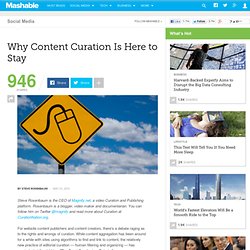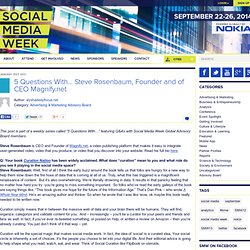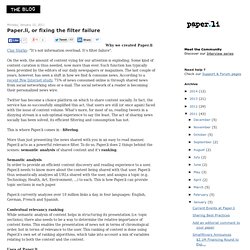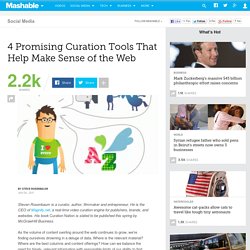

Why Content Curation Is Here to Stay. Steve Rosenbaum is the CEO of Magnify.net, a video Curation and Publishing platform.

Rosenbaum is a blogger, video maker and documentarian. You can follow him on Twitter @magnify and read more about Curation at CurationNation.org. For website content publishers and content creators, there's a debate raging as to the rights and wrongs of curation. While content aggregation has been around for a while with sites using algorithms to find and link to content, the relatively new practice of editorial curation — human filtering and organizing — has created what I'm dubbing, "The Great Creationism Debate. " The debate pits creators against curators, asking big questions about the rules and ethical questions around content aggregation. In trying to understand the issue and the new emerging rules, I reached out to some of the experts who are weighing in on how curation could help creators and web users have a better online experience. The Issues at Hand Who are curators?
Where We Stand Now. Social Media Week / 5 Questions With… Steve Rosenbaum, Founder and of CEO Magnify.net. This post is part of a weekly series called “5 Questions With…” featuring Q&As with Social Media Week Global Advisory Board members.

Steve Rosenbaum is CEO and Founder of Magnify.net, a video publishing platform that makes it easy to integrate user-generated video, video that you produce, or video that you discover into your website. Read his full bio here. Q: Your book Curation Nation has been widely acclaimed. What does “curation” mean to you and what role do you see it playing in the social media space? Steve Rosenbaum: Well, first of all I think the early buzz around the book tells us that folks are hungry for a new way to help them slow down the fire hose of data that is coming at all of us.
Paper.li – read Twitter and Facebook as a daily newspaper. Paper.li, or fixing the filter failure. Why we created Paper.li Clay Shirky: "It's not information overload.

It's filter failure". On the web, the amount of content vying for our attention is exploding. Some kind of content curation is thus needed, now more than ever. Such function has typically been provided by the editors of our daily newspapers or magazines. Twitter has become a choice platform on which to share content socially. This is where Paper.li comes in - filtering. More than just presenting the news shared with you in an easy to read manner, Paper.li acts as a powerful relevance filter. Semantic analysis In order to provide an efficient content discovery and reading experience to a user, Paper.li needs to know more about the content being shared with that user. Paper.li currently analyzes over 10 million links a day, in four languages: English, German, French and Spanish. Contextual relevancy ranking. Paper.li. Welcome.
4 Promising Curation Tools That Help Make Sense of the Web. Steven Rosenbaum is a curator, author, filmmaker and entrepreneur.

He is the CEO of Magnify.net, a real-time video curation engine for publishers, brands, and websites. His book Curation Nation is slated to be published this spring by McGrawHill Business. As the volume of content swirling around the web continues to grow, we're finding ourselves drowning in a deluge of data. Where is the relevant material? Where are the best columns and content offerings? The solution on the horizon is curation. In the past 90 days alone, there has been an explosion of new software offerings that are the early leaders in the curation tools category. 1. Storify co-founder Burt Herman worked as a reporter for the Associated Press during a 12-year career, six of those in news management as a bureau chief and supervising correspondent.
At the AP, editors sending messages to reporters asking them to do a story would regularly write, “Can u pls storify?” Be the curator of your favorite topic! Create stories using social media - storify.com. Storify's Burt Herman on the evolution from reporter to entrepreneur. For this week’s post, I sat down with Burt Herman ( @burtherman ), entrepreneurial journalist who is the CEO of Storify and founder of Hacks/Hackers .
NOTE: We did the Q&A-style interview over a collaborative document and one of my favorite tools: typewith.me . You can see the raw interview and play it back here: Burt, you have an incredible journalistic background and really, in my opinion, you truly represent the new type of tech/entrepreneur journalist we’ve all heard about. Tell me a little bit about your background at the Associated Press and how you evolved from reporter to entrepreneur. Thanks, you’re too kind Yes, I started off in a fairly typical journalism role — I went to work for the AP because I wanted to work overseas as a foreign correspondent, and they had the most opportunities to do that. I returned to the US in late 2008 for a Knight fellowship at Stanford , where I had gone as an undergrad.
It’s still very much in progress, and I’m learning more about it all the time.